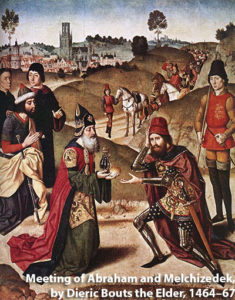Now if perfection had been attainable through the Levitical priesthood (for under it the people received the law), what further need would there have been for another priest to arise after the order of Melchizedek, rather than one named after the order of Aaron? For when there is a change in the priesthood, there is necessarily a change in the law as well. For the one of whom these things are spoken belonged to another tribe, from which no one has ever served at the altar. For it is evident that our Lord was descended from Judah, and in connection with that tribe Moses said nothing about priests.
This becomes even more evident when another priest arises in the likeness of Melchizedek, who has become a priest, not on the basis of a legal requirement concerning bodily descent, but by the power of an indestructible life. For it is witnessed of him, “You are a priest forever, after the order of Melchizedek.” For on the one hand, a former commandment is set aside because of its weakness and uselessness (for the law made nothing perfect); but on the other hand, a better hope is introduced, through which we draw near to God. –Hebrews 7:11-19
Most of us dream of perfect things: the perfect wedding day, a perfect delivery of a child, the perfect music recital. As we get older, we know that perfection isn’t obtainable. Hebrews has quite a bit to say about perfection. It’s easy for us think that this applies only to moral perfection, as if not only every evil action, but, through tough moral effort, even every thought and motive could be smoothed into perfection.
Taking a closer look at Hebrews shows that perfection might better be translated completeness. God has an intention for the world, which includes human morality no doubt, but is much bigger. God is working to bring his world to perfection (completeness) and he does that primarily through Jesus Christ.
Those living under the Law of Moses had quite an involved system of the temple, sacrifices, priests and so on. This was good and had great value. What it didn’t have was permanency. All these things pointed forward to the eventual perfection that they themselves could never bring about.
The passage above is where in Hebrews we find out that the Aaronic or Levitical priesthood had problems. The biggest of those problems was that the priests all died. They met legal requirements, but weren’t perfect or complete. Enter Jesus! His priesthood was not in the order of Aaron. He was not a Levite, but descended from the tribe of Judah. Where, then, did he get his right to priesthood? From Melchizedek and in that order he had the “power of an indestructible life.”
Much could be said about this, but there is another word besides perfection that Hebrews likes to bring up. That is the word better. It occurs more times in the book of Hebrews than the rest of the Newer Testament put together. We find here that Jesus’ priesthood is better because he is a priest forever. Since the “law made nothing perfect…a better hope is introduced.” And in that hope, and only that hope, we may draw near to God. And that’s the gospel.
Come hear it preached and enacted in the Supper this Sunday!
